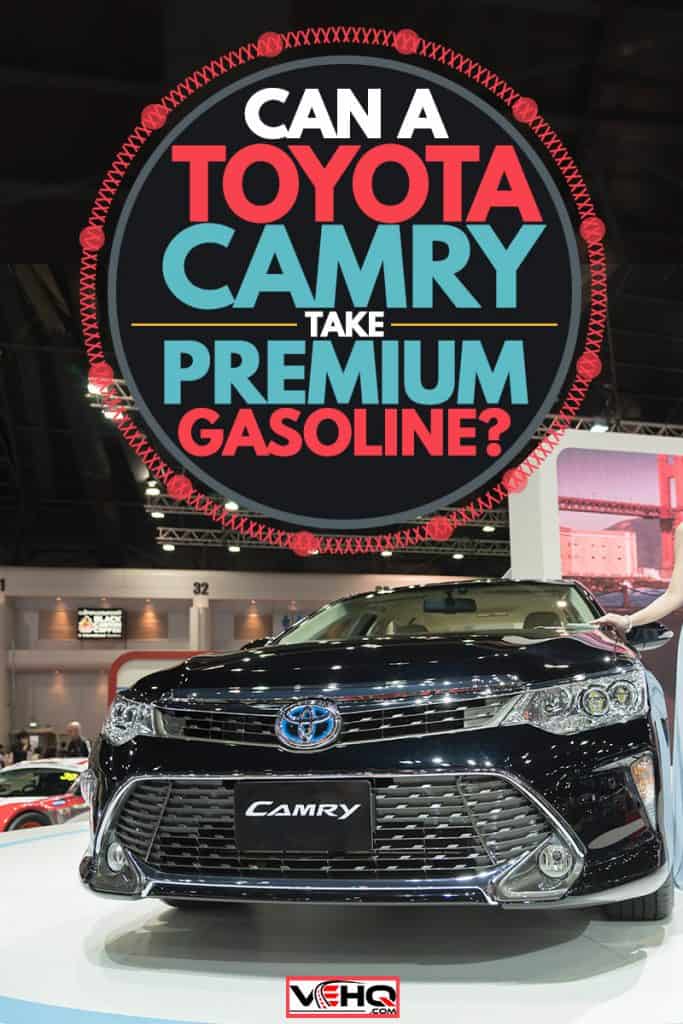People are often confused about which type of gas to fuel in a new car. Toyota’s affordable models usually call for regular, unleaded fuel, but can the Camry also take premium gasoline? We researched this, so you know what is best for your car!
Premium fuel will not harm the engine of a Toyota Camry but it won't provide any advantage either. High octane fuel is more expensive than low octane fuel and offers no substantial benefit to engines with low compression ratios. Therefore, low octane fuel is recommended for the Camry.
There is a lot to understand about the type of fuel that you can use in your Camry. Keep reading for all the details!

Can a Toyota Camry Take Premium Gas?
The Camry is rated to use regular unleaded gasoline, but running premium in it will not hurt it. It won’t help it either, though, and will just cost you more money on fuel.
What Happens if You Put Premium Gasoline in a Regular Gas Car?
Premium gasoline is suitable for engines with a low compression ratio. Its ability to resist heat and temperature is what distinguishes it from regular leaded fuel. Choosing it over regular gasoline will not affect the engine. The owner’s manual may suggest premium gasoline for specific vehicles, but this is optional. The Ford-150 and Mazda MX-5 Miata may experience a slight improvement in fuel economy.
Which Gas is Better, Regular, or Premium?
It depends on which car you drive. While premium fuel is of higher quality, it only benefits engines with high compression ratios. Both grades of gasoline contain only a small percentage of ethanol, a renewable, plant-based alcohol fuel. Premium fuel roughly costs 50 cents more per gallon than regular fuel, and the performance outcome does not match the cost. Motorists will not see an increase in gas mileage or enjoy a smoother ride. On occasion, using premium fuel may temporarily correct a pre-ignition issue in a vehicle that runs on regular gasoline.
Also, high octane gasoline is better for carrying heavy loads in extreme temperatures. However, under normal conditions, premium gasoline has no definite, long-term effects on engine function. Keeping up with scheduled maintenance and driving at a reasonable speed will enhance fuel efficiency. Premium fuel could reduce CO2 emissions, and for some consumers, a decrease in petroleum usage is worth the extra expense.
Premium unleaded fuel is not the same as premium diesel fuel. Diesel should never be pumped into a regular engine vehicle. The engine will malfunction, resulting in costly repairs.
Will Regular Gasoline Harm a Premium Gasoline Engine?
It can. Regular gasoline is typically rated at 87 octane, midgrade at 88-89, and premium at 91-94. You may see names such as unleaded, super, and premium. The EPA officially banned leaded gasoline in 1996 because of its toxic properties. It was initially added to fuel to boost octane levels. In 1973, the EPA began to regulate lead and other harmful compounds. Leaded gasoline is also banned in many other parts of the world.
Premium gas with a rating of 85 can be found in remote, high-elevation areas, but it is only compatible with much older vehicles that contain carbureted engines. High octane fuel contains less volatile properties and can withstand high compression rates. A higher heat level is required to release mechanical energy. Compression is the amount of heat generated in the cylinder’s volume. 87 octane fuel is unable to endure this compression level. If the temperature and pressure levels get too high in the chamber, detonation will occur in the fuel charge. This often results in that familiar “knocking” sound upon acceleration. Frequent detonation may damage the engine.
Octane levels are measured by combining iso-octane, heptane, and toluene. Knock intensities signal pre-ignition. They are observed in the sample bracket as the engine’s cylinder height is adjusted to alter the engine’s compression ratio.
The Top Tier Gasoline Standard asserts that extra detergent additives in premium gas prevent deposit buildup on fuel injectors and intake valves. This allows for a clean release of energy during the compression process.
Turbo Engines
Some consumers argue that turbo engines can safely run on lower octane gas. Turbocharged engines are smaller than traditional engines, and equip each cylinder with an individual coil. Direct fuel injection allows for maximum combustion output. The extra torque allows for smoother navigation on highways. Even at low speeds, the smaller engines can outpace the larger ones. The engines employ a turbine and air compressor to harness waste exhaust gases. These gases pull more air into the intake valve, and an oil cooling system prevents overheating before the air hits the cylinders. The engine can run at a speed of 250,000 RPM.
Turbo engines have more efficient sensors that can quickly change the ignition and spark timing, preventing premature detonation. However, this also requires more power from the sensors. These ignition and spark timing changes could reduce fuel economy and emissions. Consumers should use caution when considering low-octane gasoline for their turbochargers. While these vehicles may display no problems running on regular fuel, premium gasoline is generally recommended for optimal performance.
Is It Bad to Mix Regular Gasoline with Premium Gasoline?
As long as the vehicle can accept regular gasoline, then it is safe to mix fuels with different octane ratios. Premium fuel contains no additional chemical properties. This blend should not go into premium gasoline vehicles.
While a Toyota Camry runs efficiently on premium fuel, regular fuel is more economical. With sophisticated technology in place, a detonation risk is rare. The decision is up to the consumer, whether it be for economic or environmental reasons. However, always use clean fuel, no matter the octane rating. It serves no purpose to purchase premium fuel filled with pollutants.
